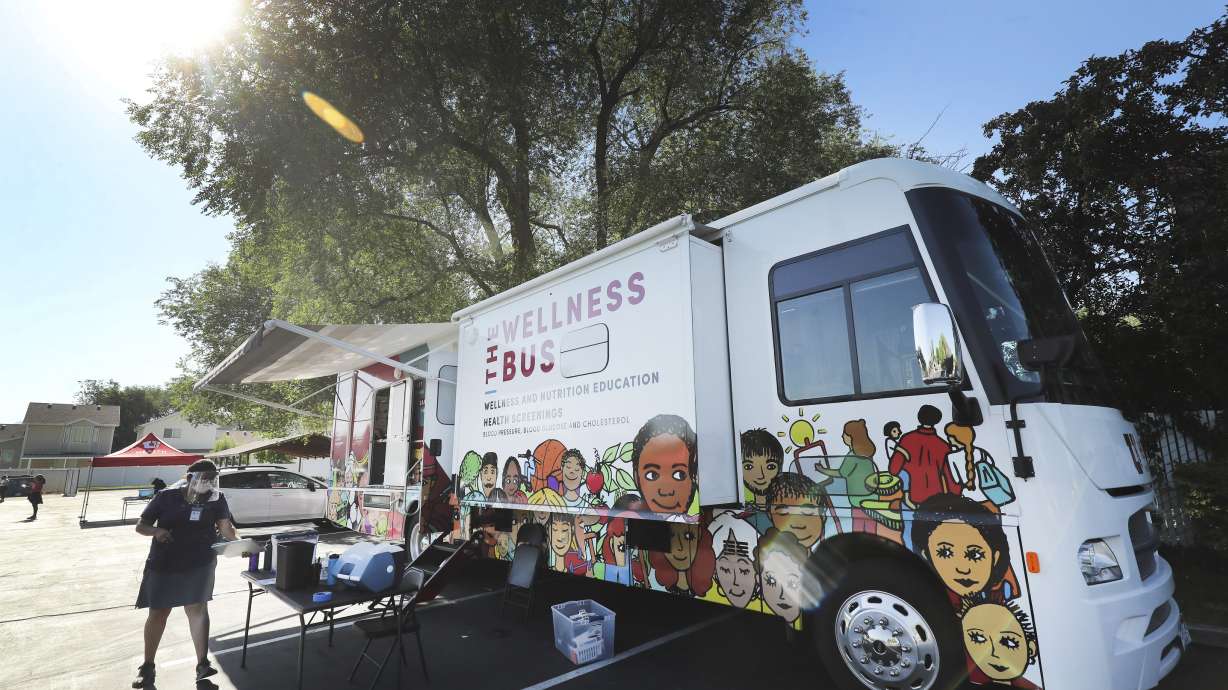Estimated read time: 5-6 minutes
This archived news story is available only for your personal, non-commercial use. Information in the story may be outdated or superseded by additional information. Reading or replaying the story in its archived form does not constitute a republication of the story.
SALT LAKE CITY — Alexandria Taylor, a mother of three whose entire family tested positive for COVID-19, says her husband’s undocumented status kept the family from receiving any federal aid money, even though her husband has paid taxes for more than 20 years.
“COVID-19 literally shut down my home and our lives for almost two months and still continues to affect us physically, mentally, emotionally and financially,” Taylor said. “My husband is the main source of income in our home and my income is second. But just imagine everyone home sick and no income with kids and bills piling up and our mortgage payment getting behind.”
According to a report released Tuesday morning by Voices for Utah Children and Comunidades Unidas, all of Utah’s nearly 79,000 undocumented immigrants have been excluded from $154.4 million in emergency assistance outlined in the Coronavirus Aid, Relief, and Economic Security Act.
“We want to make it a point that this is not only unfair to the undocumented community here in Utah, but also it’s very detrimental to Utah’s economy as a whole seeing as this $154.4 million could’ve been spent back into Utah’s consumer economy creating those ripple effects ... helping reduce unemployment and helping speed up recovery from this pandemic,” report author Mario Ramirez-Arrazola said.
His report showed most undocumented Utahns work in industries where workers are considered essential, such as the service industry, construction and manufacturing.
The state’s Latino community has been disproportionately affected by the pandemic, making up nearly 39% of all COVID-19 infections despite making up only 14% of the state’s population, according to Utah Department of Health statistics posted Tuesday.
Taylor’s husband works installing and repairing countertops, but his work slowed down when the pandemic first hit because people were uncomfortable inviting outsiders into their homes. Now, he’s been out of work caring for his sick family and eventually came down with the disease himself.
Taylor began to tear up as she recounted the struggles her family has faced since they were all diagnosed. She talked about how hard it was being isolated from her family because she was hit the hardest with COVID-19 symptoms.
She said she feared going to sleep, worried that she wouldn’t wake up because of how hard it was to breathe, and she was scared to call the paramedics because she didn’t want to scare her girls and end up dying in the hospital.
When she heard about the aid the government was providing to Americans, she became hopeful. However, that changed when she realized her husband’s status would prevent her or her family from receiving financial help even though she and her three daughters are U.S. citizens.
“I know this is a lot, but what my family and I just went through is a lot. Because of this, I would like to ask our elected officials to open your hearts and to put yourselves in the shoes of all these families who did not receive a stimulus check and recognize the struggle and know that, even though the government did not step up to help us, the state has the opportunity to make that difference in our families’ lives during these difficult times,” Taylor said.
Aimee Contreras’ family also didn’t qualify for stimulus money because her parents are undocumented, and they are considered essential workers as janitors.
“My parents were frustrated having to work really hard because their work, their labor is being needed and, just like many others, my parents contribute to this country,” Contreras said. “(Immigrants’) work has been taken for granted and our families have been taken for granted.”
Maria Montes, with Comunidades Unidas, said thousands of immigrants in Utah are facing the same uncertainty as Taylor and Contreras about how they are going to pay their bills and feed their families.
“Through these stories, we’ve come to realize the toll that COVID-19 has had on Utah’s immigrants in particular has been disproportionate and detrimental,” Montes said. “As outlined in the report, Utah’s undocumented immigrants have been considered essential during this pandemic, but have continuously been left out. The basic principle that we have to understand is that, while the COVID-19 pandemic has hit us all, it hasn’t hit us all in the same ways.”
She said her organization is working with local cities, including Salt Lake City, to prioritize the creation of an immigrant resilience fund to give financial support to the families of undocumented residents.
“(Undocumented workers) move our state and the cities in which they work or live, and we owe it to them to ensure that they and their families can also be treated with the dignity and respect that they deserve as they face this pandemic. They aren’t asking for a handout; they pay taxes, and as such, we must extend all aid to them as well,” Montes said.
Moe Hickey, CEO of Voices for Utah Children, said there is CARES Act money that went to counties and cities that can be used to help fund immigrant relief programs “if they choose to do so.”
According to Matthew Weinstein, state priorities partnership director with Voices for Utah Children, the group’s current focus is to start by getting help for the children of immigrants.
“Let’s start with something realistic, target that $4.5 million out of the $154.4 million, let’s set that as a goal. Let’s see state and local governments and private foundations step up to the plate and help to fill that gap,” Weinstein said.








